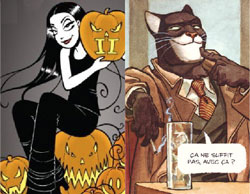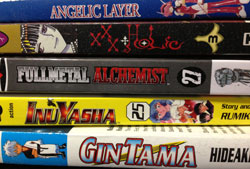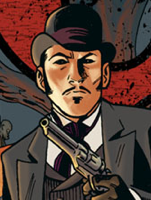
In more than seven years of doing this podcast, our coverage of European comics has been, um… underwhelming. This week, Tim tries to change that, discussing two European comics with European co-reviewers!
First, Nemi, the overzealous goth girl from Norway, whose eponymous strip by Lise Myhre has become popular in numerous European countries. Norwegian Line Olsson (of the Boston Comics Roundtable) joins Tim to discuss.
Then, the second Blacksad installment, “Arctic Nation”, by animators Juan Diaz Canales and Juanjo Guarnido. Is racism the point of this noirish “furry” tale, or is it just the framing device for something else? Eugenia Koumaki in Athens co-reviews with Tim.
Podcast: Play in new window | Download



 A maligned magician steps up in a time of crisis to become a hero! Tim and Mulele discuss Jason Love’s
A maligned magician steps up in a time of crisis to become a hero! Tim and Mulele discuss Jason Love’s  Electronic publishing has made it possible for anyone, anywhere in the world, to make their work available to millions of people. Chinese graphic designer and sometime comic creator Liu Jing is one of them. He’s using modern technology to put out his comics history of one of the world’s oldest civilizations:
Electronic publishing has made it possible for anyone, anywhere in the world, to make their work available to millions of people. Chinese graphic designer and sometime comic creator Liu Jing is one of them. He’s using modern technology to put out his comics history of one of the world’s oldest civilizations: 
 Yet again, Kumar and Dana go all nationalistic to discuss another Canadian icon: the best there is at what he does, th’ ol’ Canucklehead, Wolverine, bub. First on the chopping block is Wolverine (1982) by Chris Claremont and Frank Miller, a comic which tries to not be paint-by-numbers, but ends up being little else. And, Barry Windsor-Smith’s Weapon X, which was apparently spawned from a universe in which neither paint nor numbers exist.
Yet again, Kumar and Dana go all nationalistic to discuss another Canadian icon: the best there is at what he does, th’ ol’ Canucklehead, Wolverine, bub. First on the chopping block is Wolverine (1982) by Chris Claremont and Frank Miller, a comic which tries to not be paint-by-numbers, but ends up being little else. And, Barry Windsor-Smith’s Weapon X, which was apparently spawned from a universe in which neither paint nor numbers exist.

